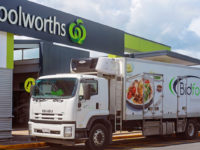
Artificial intelligence (AI) is becoming an increasingly important part of the strategy of Australia’s biggest supermarkets, speeding up distribution centre processes and influencing shopping behaviour at the online checkout, for a start.
Supermarket giant Coles is working with Microsoft to transform its shopping experience through AI, with the partnership set to deliver a more personalised and data-driven customer experience.
Speaking at the Adobe Experience Makers Live event on Friday, Coles chief marketing officer Lisa Ronson said that emotional intelligence (EQ) will continue to play a pivotal role alongside AI.
“I don’t think that [EQ and AI] are mutually exclusive, I don’t see a world where AI dominates, and there’s not a role for humans, because I think that would be a bit sad,” said Ronson.
“[AI] really enhances that human-centred customer experience design and makes it better. It learns about customers and how we can serve our customers better. At a macro level when you get that nice harmony between them it really works well.”
Coles is using AI to make more relevant personalised recommendations to customers based on past purchases.
“I have a really strong belief that consumers are OK with us using their data so long as it improves the customer experience,” she said.
Ronson said it comes down to the “value exchange”. In supermarket terms, delivering value for consumers can be as simple as knowing the brands that consumers prefer or whether they have any dietary requirements, she explained.
And while consumers are willing to give a little to receive a better experience, data security remains a key concern. Ronson said it’s “critical” brands communicate clearly with consumers in terms of how they want to use their data.
“We have to, as marketers, really respect customers’ privacy … make sure they are informed and aware of how we are using their data, and that they are OK with that,” Ronson said.
It’s been a challenging year for Australia’s supermarkets, as they grappled with the effects of panic buying at the height of the Covid-19 outbreak. Ronson said Coles was able to lean on multiple data sources to guide the retailer through the intense stockpiling period.
“From the beginning of March, when panic buying started, we’ve been really heavily leaning on all of our partners, not just our research and insights partners actually, our technology partners, who really sift through large large volumes of data on a minute-by-minute, hour-by-hour basis, and serve it up to us in a way that’s very insightful. We’ve been drawing on a lot of those sources … to really understand the sentiment of all Australians.”
Ronson said this data has been critical to helping Coles deliver on its purpose to ‘sustainably feed all Australians to help them lead healthier, happier lives’.
“That’s never been more important than what it is now.”
With data collection a key focus for retailers, Ronson highlighted the importance of ensuring data transcends all departments.
“[Data] informs so much of what we do, business strategy, financial projections, customer experiences … If we silo the data in one department it won’t be used to put the customer experience at the best level it can be.”
















